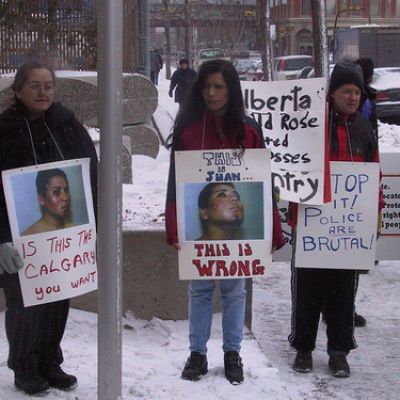It may be tempting, when watching incidents of police brutality in the United States, to think the problem does not really exist in Canada. However, police misconduct and a lack of accountability do exist in Canada.
Videos recently surfaced of RCMP officers aggressively arresting a man in Kelowna on May 30, 2020. One officer is seen striking him in the head. Kelowna’s RCMP superintendent Brent Mundle called it “concerning” and “shocking to many people.” The incident is under review to “ensure that all protocols and procedures were followed.”
Earlier this month in New Brunswick, Chantel Moore, a 26 year old British Columbian, was fatally shot by police officers. Her family states that this is not the first time they’ve lost a family member to police violence.
From Alberta, Athabasca Chipewyan Chief Allan Adam’s claims that in March, 2020, Wood Buffalo RCMP officers beat him and arrested him. Alberta’s Serious Incident Response Team (ASIRT) is investigating. The ASIRT investigates “serious or sensitive” matters that “may have resulted from the actions of a police officer.” It does not accept complaints from the general public.
Remarkably, Alberta’s RCMP deputy commissioner denies that systemic racism exists.
Below are just a few of the cases involving discrimination within Canadian police forces.
Starlight Tours, R. v. Munson
In a decades long practice dating back to at least the 1970s, Saskatoon Police Service (SPS) members would arrest indigenous people, drive them to remote rural areas and abandon them on cold winter nights. The practice was known as “starlight tours.”
In the early 2000s, inquests were held into a number of indigenous people who died outside Saskatoon of hypothermia. A National Film Board produced an award winning documentary. A Commission of Inquiry released a report regarding one such death.
Despite convictions and even prison sentences for related offenses, no SPS member has been convicted of murder connected to an indigenous person dying of hypothermia.
Merlo v. Canada
Two former RCMP employees, Janet Merlo and Linda Gillis Davidson, sued the RCMP, alleging that female officers experienced decades of gender and sexual orientation-based bullying, discrimination, and harassment. This impacted their RCMP careers and caused physical and psychological damage, personal expense, and loss of income.
Their claims were certified as a class action. In Merlo v. Canada, the Federal Court approved a 2017 settlement. The estimated payout was $90 – $100 million. The claims dated back to September 16, 1974 – the first date on which women were eligible to join the RCMP.
Tiller v. Canada
Cheryl Tiller, Mary-Ellen Copland and Dayna Roach pursued claims on behalf of certain female employees in non-policing roles within the RCMP who were subject to systemic gender or sexual orientation based harassment and discrimination similar to that in Merlo.
In March, 2020, in Tiller v. Canada, the Federal Court approved a settlement. The estimated payout was $100 million.
O’Farrell et al v. Attorney General of Canada
Caroline O’Farrell was a Staff Sergeant with the RCMP. She, her children and her former husband sued the RCMP for damages arising from her experiences with the RCMP’s Musical Ride between April 1986 and July 1987.
Ms. O’Farrell claims that she was the victim of several incidents of harassment, assault and sexual assault, perpetrated by her RCMP Musical Ride colleagues.
She also claims that following the largest internal investigation ever conducted in Ottawa, the RCMP took no substantial action against her harassers, most of whom continue to work in the RCMP today.
Acknowledgment
Numerous reports have studied the pervasiveness of harassment and discrimination within the RCMP.
In 2016, then- RCMP commissioner Bob Paulson apologized for “shameful conduct” by the organization. He acknowledged a culture of “bullying, intimidation, and general harassment” within the RCMP.
In Summary
Those who survive police brutality and discrimination may experience long lasting effects in all areas of their lives, including employment and family relationships.
There is cause to be marching in the streets. Issues of entitlement and lack of accountability within our police forces ought to concern us all. Far reaching cultural and systemic changes are long overdue.
This is a slightly modified version of an article that appeared in the Kelowna Capital News and other online publications on or about June 14, 2020. The content of this article is intended to provide very general thoughts and general information, not to provide legal advice. Advice from an experienced legal professional should be sought about your specific circumstances. We may be reached through our website at inspirelaw.ca.
